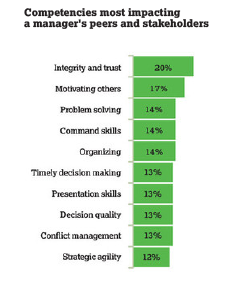by Charles Plant | Jun 5, 2012 | Leadership Development
Last week this blog looked at a Futurestep survey and something it calls consequential impact which is essentially your ability to get things done through others. Another question the survey attempted to answer was what skills are necessary for you to have consequential impact on your peers. The answer for this was a tad surprising in that it concluded that for you to have peer impact, the most important thing was to have integrity and trust as well as be a good motivator. Once again, the soft skills triumped the hard skills in that getting things done through peers is still primarily done through leadership skills, not through problem solving, organizing , and good decision making.

by Charles Plant | Jun 4, 2012 | Emotional Intelligence, Exercises
Your ability to control unexpected emotions like anger and frustration and not display other negative emotions are hallmarks of Emotional Intelligence. (I must admit that I wasn’t always very good at this and I like to think that with age comes maturity.) The reason that you need to cure the habit and control negative emotions is probably self apparent.
Nobody wants to work with a Debbie-Downer.
After all, who wouldn’t prefer to work with someone who exhibited happiness over sadness, joy over grief, contentment over frustration. Emotions are contagious and if you’re stuck with a negative person, you’ll find your energy drained and begin avoiding their company.
The first step in curing this nasty habit is to be aware that you’re showing your negative emotions. While it isn’t easy to see these in yourself until after the fact, it is easier to see in people you are working with.
 Try this at work:
Try this at work:
Your exercise this week is to pay attention to coworkers negative emotions. Take out your notebook and write down every time someone at work exhibits a negative emotion. That emotion could be anger, frustration, irritation, cynicism or whatever other negative emotion you detect. When you note this negativity, note how you feel as a result and how this mood affects those around you. If you keep noting this behaviour in others, you’ll come to notice it in yourself and that is the first step to stopping the habit.
When you have a chance, write a comment to tell me about what you observed and whether that made you question your own display of emotions.
by Charles Plant | Jun 1, 2012 | Management
 There is a great debate in the Globe and Mail today about whether Yahoo’s fired CEO, Carol Bartz should not have used the word “Fcuk” at work. (You’ll have to read the article on page B14 as I can’t find a link.) “Using profanity on the job can make you look unprofessional – but it can also be a good motivational tool.” Apparently it’s no good in a job interview (who knew?) but good for women to use to put men at ease. (What? It doesn’t put men at ease, it just titillates us.) It’s good in some areas of the world, not so good in others, it works in some industries but not in others. It can diffuse tense situations but make others more tense. Huh?
There is a great debate in the Globe and Mail today about whether Yahoo’s fired CEO, Carol Bartz should not have used the word “Fcuk” at work. (You’ll have to read the article on page B14 as I can’t find a link.) “Using profanity on the job can make you look unprofessional – but it can also be a good motivational tool.” Apparently it’s no good in a job interview (who knew?) but good for women to use to put men at ease. (What? It doesn’t put men at ease, it just titillates us.) It’s good in some areas of the world, not so good in others, it works in some industries but not in others. It can diffuse tense situations but make others more tense. Huh?
OMG, what is the world coming to when one must worry about a well placed “Fcuk” every now and then? The next thing you know they’ll be putting in a “No Touching” rule, banning Filterless Fridays, and putting the kibosh on Topless Tuesdays. (Please note that I finally agreed that Topless Tuesdays was not mandatory but optional at work.)
Given the predilection to create employment standards I can envision a day when HR departments the world over have to develop policies around the use of the term “Fcuk.” In an effort to help the development of such policies, I have prepared the following rules:
Policies regarding the use of the word “Fcuk” in the workplace.
- In general, the word “Fcuk” shall not be used outside closed offices or meeting rooms unless one is still working after 9:00 PM.
- The word may be used at will by consenting adults who are engaged in a workplace affair.
- After several drinks at a workplace function, the word may be sprinkled into conversation at random if desired.
- The word “Fcuk” is encouraged in meetings where the actions of upper management are discussed by subordinates. In this case, the adjective “Fcuking” may be used as appropriate.
- It may only be used as a noun and never as a verb.
- If used in writing it should be referred to as the “F Word” because that really fools everyone.
I’m sure we can generate all sorts of other rules so here is your chance. If you have any other rules about the use of the word “Fcuk”, please send them to me via comments. (Please avoid the use of profanities in your comments though as I have tender ears.)
by Charles Plant | May 31, 2012 | Literature Review, Management
Some time ago I subscribed to Harvard Business Review (for the umpteenth time), just to get a collection of articles called Leadership Insights. The first in the collection is a reprint of Henry Mintzberg’s “The Manager’s Job”. If you haven’t read it recently, it is worth a re-read. Based on a review of research into how manager’s spend their time it debunks a lot of old folklore and although it was first written in 1975, is still applicable today.
What struck me the most was at the very end of the article. In it Mintzberg states that management schools have done”an admirable job of training the organization’s specialists – management scientists, marketing researchers, accountants, and organizational development specialists. But for the most part they have not trained managers.”
And Now Time For a Rant
It’s sad to think that 40 years after Mintzberg first published a book on this subject, we are still not doing a better job training managers. This training is still not happening in MBA programs for the most part and few companies are doing it well. A friend told me that she is studying for an exam to enable her to become a Certified Meeting Professional. If there is a course for meeting professionals, just as there is for Corporate Trainers, Project Managers, Aestheticians, and a host of other disciplnes, why is there no course or certification for managers, something that 10s of millions of people do worldwide?
by Charles Plant | May 30, 2012 | Emotional Intelligence, Leaders
 When you think of famous inventors, you often think of people working away in their labs, day after day, alone, producing failure after failure until they eventually succeed. Inventors are thus rightly known for their persistence. As a leadership skill, persistence is often underrated. When you think of Orville and Wilbur Wright, you would be right to credit them with persistence but not perhaps for the area in which they exhibited their greatest persistence, that of marketing their invention.
When you think of famous inventors, you often think of people working away in their labs, day after day, alone, producing failure after failure until they eventually succeed. Inventors are thus rightly known for their persistence. As a leadership skill, persistence is often underrated. When you think of Orville and Wilbur Wright, you would be right to credit them with persistence but not perhaps for the area in which they exhibited their greatest persistence, that of marketing their invention.
Innovation = Idea + Marketing
I’ve used this formula before in a blog and when most people think of persistence, they think in terms of coming up with a working idea. In actual fact, marketing can take much more persistence that inventing and Orville and Wilbur Wright are an excellent example of this. You might know that the Wrights made the first powered flight on December 17th 1903. In 1904, they set up an air strip in Dayton and flew every day but hardly any reporters came to see them.
With 105 flights under their belt, they wrote the US government to see if the army might be interested. The War Department responded that they were not interested in providing financial assitance until such a device could be “brought to the stage of practical operation without expense to the US government” which they had already done.
In October of 1905, the Wrights wrote the government again and by this time they had made flights of up to 39 minutes over 20 miles. The War department declined once again with the same comments and this so discouraged the Wrights that they basically ceased flying as the Wrights couldn’t see any use for airplanes other that for military purposes.
Persistence pays off
Finally, in 1907, an employee on the Army Signal Corps who was following the early flight pioneers convinced the government to give airplanes a try. The government acting very responsibly, put out a tender and got 41 bids. The Wrights finally won the tender and were able to make a sale to the US government. their persistence had paid off but it took almost 5 years from when they made their first flight until they got their first sale.
As a leader, are you persistent or do you give up too early?




